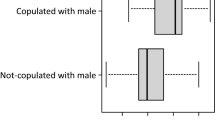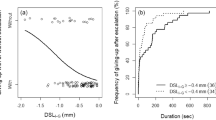Abstract
Prior social experience often affects subsequent competitive interactions and their outcomes. Although the effects of prior contest experience have been widely examined, effects of mating experience remain less well examined. We examined, in males of the hermit crab Pagurus nigrofascia, whether males successively copulated with more than one female and whether males with copulation experience differed in their subsequent contest behaviors and probability of winning in male-male contests compared to males without copulation experience. The copulation experience of intruders was manipulated and the contest behaviors compared between mated and unmated groups. Males mated with several females regardless of the male body size. Compared with unmated intruders, intruders with mating experience succeeded more often in taking over females and did so within a shorter period particularly when the male-male contests occurred over females with a long time to molt. These results suggest that mated males of P. nigrofascia overestimate the female quality and/or enhance the competitive performance similar to the “winner effect” that is a positive feedback from prior winning experience to future contests.


Similar content being viewed by others
References
Akaike H (1983) Information measures and model selection. Bull Int Stat Inst 44:277–291
Andersson M (1994) Sexual selection. Princeton University Press, Princeton
Arnott G, Elwood RW (2008) Information gathering and decision making about resource value in animal contests. Anim Behav 76:529–542
Arnott G, Elwood RW (2009) Assessment of fighting ability in animal contests. Anim Behav 77:991–1004
Bridge AP, Elwood RW, Dick JTA (2000) Imperfect assessment and limited information preclude optimal strategies in male-male fights in the orb-weaving spider Metellina mengei. Proc R Soc B Biol Sci 267:273–279
Briffa M (2013) Contest in crustaceans: assessments, decisions and their underlying mechanisms. In: Hardy ICW, Briffa M (eds) Animal contest. Cambridge University Press, New York, pp 86–112
Brown WD, Smith AT, Moskalik B, Gabriel J (2006) Aggressive contests in house crickets: size, motivation and the information contest of aggressive songs. Anim Behav 72:225–233
Brown WD, Chimenti AJ, Siebert JR (2007) The payoff of fighting in house crickets: motivational asymmetry increases male aggression and mating success. Ethology 113:457–465
Chamorro-Florescano IA, Favila ME (2008) Male reproductive status affects contest outcome during nidification in Canthon cyanellus cyanellus LeConte (Coleoptera: Scarabaeidae). Behaviour 145:1811–1821
Cox DR (1972) Regression models and life-tables. J R Stat Soc B 34:187–220
Dugatkin LA, Dugatkin AD (2011) Overestimating resource value and its effects on fighting decisions. PLoS ONE 6:e19924
Emlen DJ (2008) The evolution of animal weapons. Annu Rev Ecol Evol Syst 39:387–413
Gherardi F, Tiedemann J (2004a) Binary individual recognition in hermit crabs. Behav Ecol Sociobiol 55:524–530
Gherardi F, Tiedemann J (2004b) Chemical cues and binary individual recognition in the hermit crab Pagurus longicarpus. J Zool 263:23–29
Goshima S, Wada S, Ohmori H (1996) Reproductive biology of the hermit crab Pagurus nigrofascia (Anomura: Paguridae). Crust Res 25:86–92
Goshima S, Kawashita T, Wada S (1998) Mate choice by males of the hermit crab Pagurus filholi: do males assess ripeness and/or fecundity of females? Ecol Res 13:151–161
Guevara-Fiore P, Svensson PA, Endler JA (2012) Sex as moderator of early life experience: interaction between rearing environment and sexual experience in male guppies. Anim Behav 84:1023–1029
Hack MA, Thompson DJ, Fernandes DM (1997) Fighting in males of the autumn spider, Metellina segmentata: effects of relative body size, prior residency and female value on contest outcome and duration. Ethology 103:488–498
Hardy ICW, Briffa M (2013) Animal contests. Cambridge University Press, New York
Hazlett BA (1968) The sexual behavior of some European hermit crabs (Anomura: Paguridae). Pubbl Staz Zool Napoli 36:238–252
Hsu Y, Wolf LL (1999) The winner and loser effect: integrating multiple experience: mechanisms and outcomes. Anim Behav 57:903–910
Hsu Y, Earley RL, Wolf LL (2006) Modulation of aggressive behaviour by fighting experience: mechanisms and contest outcomes. Biol Rev 81:33–74
Judge KA, Ting JJ, Schneider J, Fitzpatrick MJ (2010) A lover, not a fighter: mating causes male crickets to lose fights. Behav Ecol Sociobiol 64:1971–1979
Kasumovic MM, Elias DO, Sivalinghem S, Mason AC, Andrade MCB (2010) Examination of prior contest experience and the retention of winner and loser effects. Behav Ecol 21:404–409
Kendall MS, Wolcott TG (1999) The influence of male mating history on male-male competition and female choice in mating associations in the blue crab, Callinectes sapidus (Rathbun). J Exp Mar Biol Ecol 239:23–32
Killian KA, Allen JR (2008) Mating resets male cricket aggression. J Insect Behav 21:535–548
Kou R, Hsu C (2013) Mating enhances the probability of winning aggressive encounters in male lobster cockroaches. Horm Behav 64:546–556
Kralj-Fišer S, Gregorič M, Zhang S, Li D, Kuntner M (2011) Eunuchs are better fighters. Anim Behav 81:933–939
Lehner SR, Rutte C, Taborsky M (2011) Rats benefit from winner and loser effects. Ethology 117:949–960
Mariette MM, Cathaud C, Chambon R, Vignal C (2013) Juvenile social experience affects pairing success at adulthood: congruence with the loser effect? Proc R Soc B Biol Sci 280:20131514
Okada K, Miyatake T (2010) Effect of losing on male fights of broad-horned flour beetle, Gnatocerus cornutus. Behav Ecol Sociobiol 64:361–369
Okamura S, Goshima S (2010) Indirect female choice mediated by sex pheromones in the hermit crab Pagurus filholi. J Ethol 28:323–329
Payne RJH, Pagel M (1996) Escalation and time costs in displays of endurance. J Theor Biol 183:185–193
Payne RJH, Pagel M (1997) Why do animals repeat displays? Anim Behav 54:109–119
Pérez-Staples D, Martínez-Hernández MG, Aluja M (2010) Male age and experience increases mating success but not female fitness in the Mexican fruit fly. Ethology 116:778–786
R Core Team (2013) R: a language and environment for statistical computing. R Foundation for Statistical Computing, Vienna
Rutte C, Taborsky M, Brinkhof MWG (2006) What sets the odds of winning and losing? TREE 21:16–21
Sainte-Marie B (2007) Sperm demand and allocation in decapod crustaceans. In: Duffy JE, Thiel M (eds) Evolutionary ecology of social and sexual systems: crustaceans as model organisms. Oxford University Press, New York, pp 191–210
Sato T, Goshima S (2007) Female choice in response to risk of sperm limitation by the stone crab, Hapalogaster dentata. Anim Behav 73:331–338
Schuett GW (1997) Body size and agonistic experience affect dominance and mating success in male copperheads. Anim Behav 54:213–224
Suga Y (2006) Chinese cricket-fighting. Int J Asian Stud 3:77–93
Suzuki Y, Yasuda C, Takeshita F, Wada S (2012) Male mate choice and male-male competition in the hermit crab Pagurus nigrofascia: importance of female quality. Mar Biol 159:1991–1996
Tanikawa D, Yasuda C, Suzuki Y, Wada S (2012) Effects of male size and mate quality on male-male contest in the hermit crab Pagurus filholi. Jap J Benthol 67:15–19
Taylor PW, Elwood RW (2003) The mismeasure of animal contests. Anim Behav 65:1195–1202
van Son TC, Thiel M (2006) Mating behaviour of male rock shrimp, Rhynchocinetes typus (Decapoda: Caridea): effect of recent mating history and predation risk. Anim Behav 71:61–70
Wada S, Tanaka K, Goshima S (1999) Precopulatory mate guarding in the hermit crab Pagurus middendorffii (Brandt) (Decapoda: Paguridae): effects of population parameters on male guarding duration. J Exp Mar Biol Ecol 239:289–298
Wang Z, Hulihan TJ, Insel TR (1997) Sexual and social experience is associated with different patterns of behavior and neural activation in male prairie voles. Brain Res 767:321–332
Whitehouse MEA (1997) Experience influences male–male contests in the spider Argyrodes antipodiana (Theridiidae: Araneae). Anim Behav 53:913–923
Yasuda C, Suzuki Y, Wada S (2011) Function of the major cheliped in male-male competition in the hermit crab Pagurus nigrofascia. Mar Biol 158:2327–2334
Yasuda C, Takeshita F, Wada S (2012) Assessment strategy in male-male contests of the hermit crab Pagurus middendorffii. Anim Behav 84:385–390
Yasuda CI, Matsuo K, Hasaba Y, Wada S (2014) Hermit crab, Pagurus middendorffii, males avoid the escalation of contests with familiar winners. Anim Behav 96:49–57
Acknowledgments
We are grateful for Ms. Y. Hasaba and Dr. C. Norman for valuable comments. Additional thanks go to the referees for their extensive and supportive comments and contributions. This study was financially supported by JSPS Research Fellowship for Young Scientists (No. 25-2149) to CY and Grants-in-Aid for Scientific Research (KAKENHI, No. 23440228) to SW.
Author information
Authors and Affiliations
Corresponding author
Additional information
Communicated by T. Breithaupt
Rights and permissions
About this article
Cite this article
Yasuda, C.I., Matsuo, K. & Wada, S. Previous mating experience increases fighting success during male-male contests in the hermit crab Pagurus nigrofascia . Behav Ecol Sociobiol 69, 1287–1292 (2015). https://doi.org/10.1007/s00265-015-1941-x
Received:
Revised:
Accepted:
Published:
Issue Date:
DOI: https://doi.org/10.1007/s00265-015-1941-x




